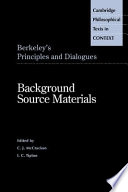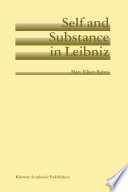 We have the ideas of matter and thinking, but possibly shall never be able to know whether any mere material being thinks or no; it being impossible for us, by the contemplation of our own ideas, without revelation, to discover whether Omnipotency has... We have the ideas of matter and thinking, but possibly shall never be able to know whether any mere material being thinks or no; it being impossible for us, by the contemplation of our own ideas, without revelation, to discover whether Omnipotency has...  An Essay Concerning Human Understanding - Page 103by John Locke - 1805 - 510 pagesFull view An Essay Concerning Human Understanding - Page 103by John Locke - 1805 - 510 pagesFull view - About this book
 | Ben-Ami Scharfstein - Philosophy - 1998 - 710 pages
...know whether or not any simply material being thinks. We are unable to discover "whether Omnipotency has not given to some Systems of Matter fitly disposed,...Matter so disposed, a thinking immaterial Substance" (4.3.6; ed. Nidditch, pp. 540-41). Leibniz, reluctant to accept such an argument, supposed that Locke... | |
 | Daniel Garber, Michael Ayers - Philosophy - 1998 - 992 pages
...'matter as matter' cannot think, it must be granted that the omnipotent God can, if he chooses, give 'to some Systems of Matter fitly disposed, a power to perceive and think'.136 The human mind may, therefore, be not an immaterial substance, but only 'a faculty of thought'... | |
 | Michael Ayers - Philosophy - 1999 - 68 pages
...for us, by the contemplation of our own ideas, without revelation, to discover, whether omnipotency has not given to some systems of matter fitly disposed,...more remote from our comprehension to conceive, that COD can, if he pleases, superadd to matter a faculty of thinking, than that he should superadd to it... | |
 | D.L. Smith - Philosophy - 1999 - 242 pages
...any mere material being thinks or no; it being impossible for us.. .to discover whether omnipotency has not given to some systems of matter, fitly disposed, a power to perceive and think, or else joined or fixed to matter, so disposed, a thinking immaterial substance (Locke, cited in Vesey, 1965: 22).... | |
 | Raymond Martin, John Barresi - Great Britain - 2004 - 220 pages
...for us, by the contemplation of our own Ideas, without revelation, to discover whether Omnipotency has not given to some Systems of Matter fitly disposed, a power to perceive and think'. The reason, Locke claimed, is that 'in respect to our Motions', it is 'not much more remote from our... | |
 | C. J. McCracken, I. C. Tipton - Philosophy - 2000 - 314 pages
...we cannot determine, with certainty, whether the mind is an immaterial substance or whether God has "given to some systems of matter, fitly disposed, a power to perceive and think."1 Berkeley took a definite position here, agreeing with Descartes, against Locke, both that... | |
 | Michael Alexander Stewart - History - 2000 - 348 pages
...any material being thought or not. It was not possible to discover without revelation whether God had given to some systems of matter "fitly disposed, a power to perceive" or joined to matter "a thinking immaterial substance". Locke's point was not that the soul was s" Locke,... | |
 | Martina Mittag - English literature - 2002 - 280 pages
...for us, by the contemplation of our own ideas, without revelation, to discover whether Omnipotency has not given to some Systems of matter, fitly disposed, a power to perceive and think, or eise joined and fixed to matter, so disposed, a thinking immaterial substance: it being, in respect... | |
 | John Locke - Religion - 2002 - 356 pages
...correctly, to discover evidence confirming the wisdom, power, and goodness of God. §o: Locke's admission that 'God can, if he pleases, superadd to Matter a Faculty of Thinking'. § 17: Our limited understanding of the powers and operations of spirits. (See also IIL vi. 1a.) §... | |
 | Marc Elliott Bobro - Philosophy - 2004 - 164 pages
...Be Moral Agents? [It is] impossible for us ... without revelation, to discover, whether Omnipotency has not given to some Systems of Matter fitly disposed, a power to perceive and think," in contradistinction to having "joined and fixed to Matter so disposed, a thinking immaterial Substance... | |
| |